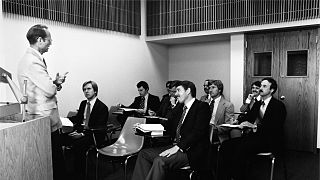 We were saddened this week to learn that Charles Ryrie, a Bible scholar who made his mark with a groundbreaking popular study Bible and many other books, died at age 90 after a long and remarkable life.
We were saddened this week to learn that Charles Ryrie, a Bible scholar who made his mark with a groundbreaking popular study Bible and many other books, died at age 90 after a long and remarkable life.
Ryrie was a prolific writer who penned many books about Christianity, covering a wide variety of topics—but a common thread through all of them was a clear passion for helping “average” Christians understand their Bibles. Although words like “doctrine” and “theology” can be intimidating—with their suggestion of stuffy scholarship, esoteric religious debates, and advanced seminary degrees—Ryrie was bold in his belief that these were words that can and should fit comfortably into the vocabulary of every Christian. Theology shouldn’t scare off anyone, he wrote in Basic Theology: A Popular Systematic Guide to Understanding Biblical Truth:

“Theology is for everyone. Indeed, everyone needs to be a theologian. In reality, everyone is a theologian—of one sort or another. And therein lies the problem. There is nothing wrong with being an amateur theologian or a professional theologian, but there is everything wrong about being an ignorant or a sloppy theologian. Therefore, every Christian should read theology. Theology simply means thinking about God and expressing those thoughts in some way.”
Ryrie committed his life to this belief, and his writing is driven by a desire to empower “everyday Christians” to study and learn the tenets of their faith. He didn’t call on Christians to study theology and doctrine for their own sake, but because he saw a strong connection between doctrine and behavior: a solid understanding of true doctrine equips you to make wise decisions in everyday life, whereas bad doctrine (or ignorance of good doctrine) leaves you with no clear foundation for making good, God-honoring decisions in daily life. “All doctrine is practical,” he wrote, “and all practice must be based on sound doctrine. Doctrine that is not practical is not healthy doctrine, and practice that is not doctrinal is not rightly based.”
That conviction shaped everything Ryrie wrote. By far, his most prominent single contribution to contemporary Christianity was the Ryrie Study Bible, which demonstrated that a study Bible was something that anyone could use. In the preface to the original 1978 edition, he wrote,
“The Bible is the greatest of all books; to study it is the noblest of all pursuits; to understand it, the highest of all goals.”
He is also known for his championship of the dispensationalist school of theology, which provided a framework for understanding the Bible by identifying different “cycles” in God’s ongoing relationship with His creation. This theological framework carries with it a strong interest in Biblical prophecy and the “end times,” and while not all Christians agree with the dispensationalist perspective, Ryrie and other scholars inspired millions of believers to turn to the Bible in an effort to understand what God is doing today, and what the future might hold for His children.
Whether or not you agree with Ryrie’s theological views, his message that theology is for everyone is an important one. I think the most fitting way to honor his life would be to reflect on your own relationship with the Bible. Do you read the Bible? Would you say that you know the Bible? Could you articulate what you believe, and how that belief affects your life in practical, everyday ways? If you’re not sure, I encourage you to take a look through the “How to Understand the Bible” and “How to Study the Bible” article series, both of which aim to help Bible beginners get started on the journey of reading and understanding God’s Word. You might also take a look at Ryrie’s many books and study Bibles, and take a few minutes to learn how you can access study Bibles like the Reformation Study Bible right here on Bible Gateway, for free.
Image: Charles Ryrie teaching a class at Dallas Theological Seminary. Credit: Dallas Theological Seminary.


